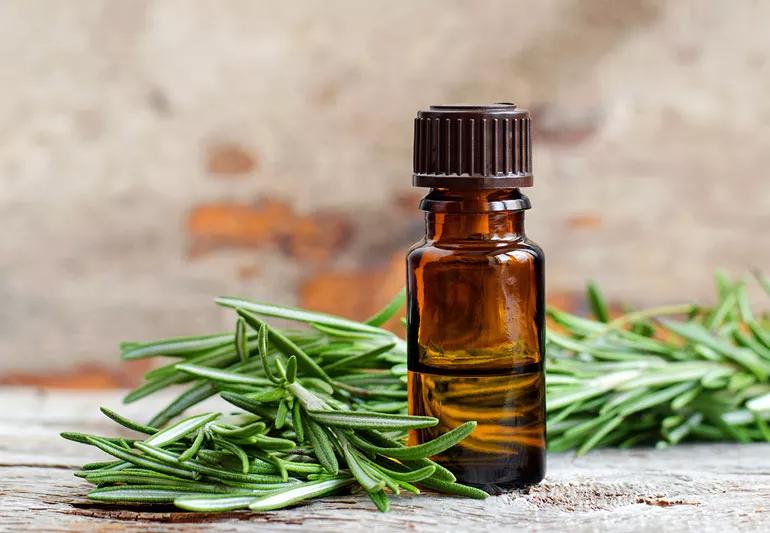Studies show that the herby oil can lead to longer, healthier hair

Image content: This image is available to view online.
View image online (https://assets.clevelandclinic.org/transform/a89aeb69-fb61-47d6-b3b9-098c04352665/rosemary-oil-1141208764-770x533-1_jpg)
Rosemary oil in an essentials oil vial with rosemary clippings in the background.
The key to growing longer and healthier hair may come down to seasoning.
Advertisement
Cleveland Clinic is a non-profit academic medical center. Advertising on our site helps support our mission. We do not endorse non-Cleveland Clinic products or services. Policy
Using rosemary oil for hair growth exploded as a TikTok trend over the past year. Nearly a billion people on the social media app have watched hair-flipping testimonials on the benefits of the extract.
So, are those TikTokers onto something or should the savory herb be left as a dinner seasoning? Let’s comb through what’s fact or fiction with dermatologist Shilpi Khetarpal, MD.
The answer appears to be yes — and there’s scientific proof behind it.
Researchers found rosemary oil to be as effective at encouraging hair regrowth as minoxidil, a medication better known as Rogaine®, says Dr. Khetarpal. The 2015 study focused on people with androgenic alopecia (male pattern baldness or female pattern baldness).
Using rosemary oil instead of minoxidil also led to fewer issues with itchy scalp at the three-month and six-month check-ins.
“The bottom line is, yes, it does seem to work,” says Dr. Khetarpal. “The study really prompted people to look at rosemary oil for hair growth. It became much more common in over-the-counter products after that, too.”
The 2015 study built on findings from 2013 and 2010 that hinted at rosemary’s potential to combat hair loss.
Video content: This video is available to watch online.
View video online (https://www.youtube.com/embed/v-OvEV5uwZE)
YouTube video player
So, why does rosemary oil act like Miracle-Gro® when rubbed onto your scalp as a highly concentrated extract? Much of the credit goes to carnosic acid, a phenolic chemical compound in the plant.
Advertisement
Carnosic acid carries anti-inflammatory and antioxidant properties that can help rejuvenate damaged nerves and tissue in your body. Applying it to your scalp creates an environment where your hair can thrive.
“If you increase blood flow to the scalp, you give your hair the nutrients it needs to shed less, grow more and just be a bit healthier,” explains Dr. Khetarpal.
Aside from promoting a hair growth spurt, rosemary oil has been linked to hair benefits such as:
If you want to give rosemary oil a try to grow a thicker head of hair, Dr. Khetarpal offers these six tips and recommendations:
Coarse hair may be better able to handle an application of rosemary oil. But people with finer hair might find that using the product makes their locks look greasy or weighed down.
“Everyone can use rosemary oil, but you might need to modify how often you use it depending on your hair type,” suggests Dr. Khetarpal. “Some people might be able to use it daily. Others may see that one or twice a week works best.”
Although considered relatively safe to use, rosemary oil isn’t recommended if you’re pregnant or breastfeeding (chestfeeding). Warning labels on some 100% rosemary products warn that use could affect the fetus or lead to a miscarriage.
Rosemary oil may be able to help if you’re dealing with hair loss. But Dr. Khetarpal cautions against expecting dramatic results.
“You want to be realistic,” she says. “If you’ve had hair loss for over 20 years, don’t expect it to work wonders. It might help a bit, particularly if your hair loss is just starting, but the extent of the improvement is variable. There are no guarantees.”
Advertisement

Delivered every Tuesday!
Sign up for our Health Essentials emails for expert guidance on nutrition, fitness, sleep, skin care and more
It's a letter about the news!

Every two weeks once
Sign up for our Health Essentials emails for expert guidance on nutrition, fitness, sleep, skin care and more.
Learn more about our editorial process.
Advertisement
Though this is a myth, the ‘stubble stage’ struggle is real, but moisturizing can help
Hair type, medical conditions, age and ethnicity all might play a role
It’s not a substitute for good old washing and rinsing
Learn the reason why it’s a part of many beauty routines
From bleaching to brushing tips, here's your guide to cold weather hair care
The short answer from a dermatologist
Don’t let harsh chemicals damage skin or hair
Pantothenol is a powerful moisturizer and can help repair damaged skin and hair
Type 2 diabetes isn’t inevitable with these dietary changes
Applying a hot or cold compress can help with pain
Pump up your iron intake with foods like tuna, tofu and turkey